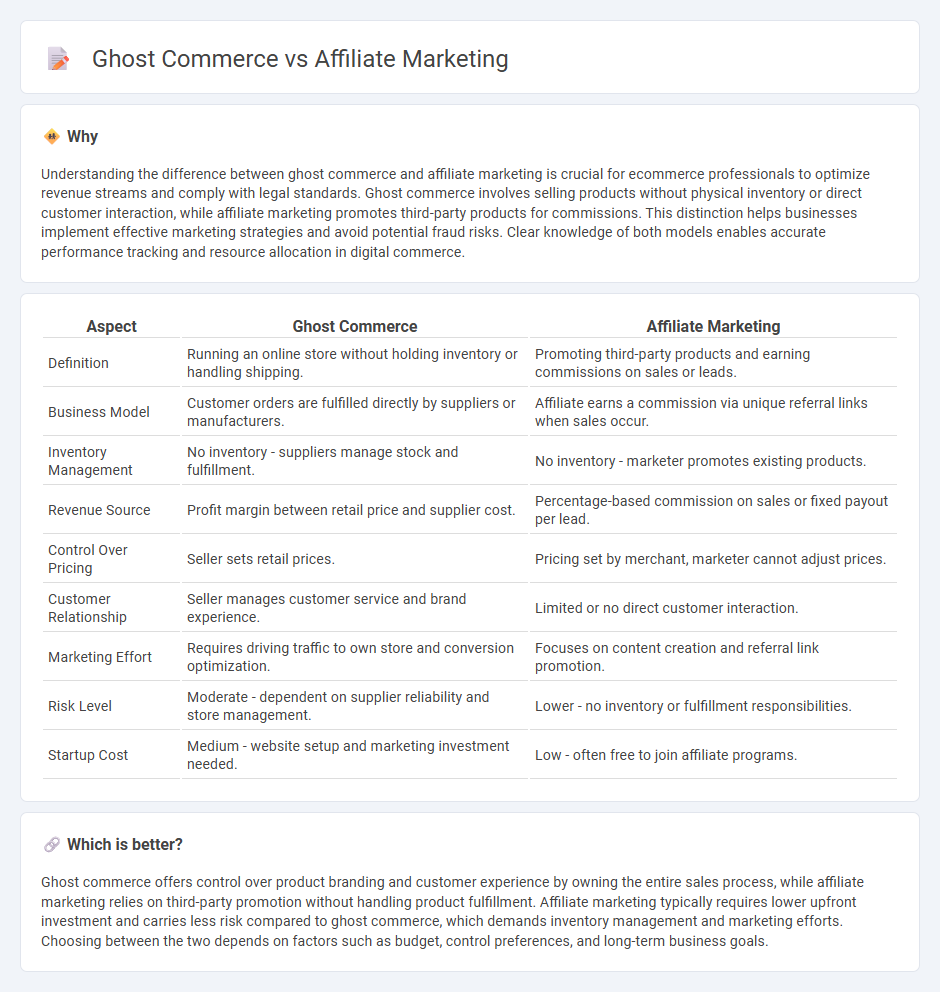
Ghost commerce involves selling products without revealing the seller's identity, often leveraging third-party platforms to manage transactions and customer service. Affiliate marketing promotes products through personalized links, earning commissions based on sales generated by referred traffic. Discover how these distinct strategies can optimize your online revenue streams and business growth.
Why it is important
Understanding the difference between ghost commerce and affiliate marketing is crucial for ecommerce professionals to optimize revenue streams and comply with legal standards. Ghost commerce involves selling products without physical inventory or direct customer interaction, while affiliate marketing promotes third-party products for commissions. This distinction helps businesses implement effective marketing strategies and avoid potential fraud risks. Clear knowledge of both models enables accurate performance tracking and resource allocation in digital commerce.
Comparison Table
| Aspect | Ghost Commerce | Affiliate Marketing |
|---|---|---|
| Definition | Running an online store without holding inventory or handling shipping. | Promoting third-party products and earning commissions on sales or leads. |
| Business Model | Customer orders are fulfilled directly by suppliers or manufacturers. | Affiliate earns a commission via unique referral links when sales occur. |
| Inventory Management | No inventory - suppliers manage stock and fulfillment. | No inventory - marketer promotes existing products. |
| Revenue Source | Profit margin between retail price and supplier cost. | Percentage-based commission on sales or fixed payout per lead. |
| Control Over Pricing | Seller sets retail prices. | Pricing set by merchant, marketer cannot adjust prices. |
| Customer Relationship | Seller manages customer service and brand experience. | Limited or no direct customer interaction. |
| Marketing Effort | Requires driving traffic to own store and conversion optimization. | Focuses on content creation and referral link promotion. |
| Risk Level | Moderate - dependent on supplier reliability and store management. | Lower - no inventory or fulfillment responsibilities. |
| Startup Cost | Medium - website setup and marketing investment needed. | Low - often free to join affiliate programs. |
Which is better?
Ghost commerce offers control over product branding and customer experience by owning the entire sales process, while affiliate marketing relies on third-party promotion without handling product fulfillment. Affiliate marketing typically requires lower upfront investment and carries less risk compared to ghost commerce, which demands inventory management and marketing efforts. Choosing between the two depends on factors such as budget, control preferences, and long-term business goals.
Connection
Ghost commerce leverages affiliate marketing by utilizing third-party content creators who promote products without holding inventory, driving sales through tracked affiliate links. This model reduces overhead costs and streamlines operations, as merchants rely on affiliates to generate traffic and conversions. The synergy between ghost commerce and affiliate marketing enables scalable, low-risk e-commerce ventures with performance-based revenue sharing.
Key Terms
Commission Structure
Affiliate marketing typically offers commissions based on a percentage of sales generated through unique referral links, incentivizing marketers to drive high-converting traffic. Ghost commerce, however, often involves fixed or tiered commissions linked to product in-house sales performance, with less reliance on third-party platforms. Explore the detailed commission structures of both models to optimize your revenue strategy.
Brand Ownership
Affiliate marketing allows businesses to leverage third-party promoters, generating sales without owning customer relationships or brand control. Ghost commerce, in contrast, involves owning the brand and customer data while outsourcing fulfillment, which enhances brand identity and long-term equity. Explore further to understand how these models impact brand ownership and business growth strategies.
Customer Relationship
Affiliate marketing leverages partnerships to promote products, relying on third parties to attract and convert customers without directly managing the customer relationship. Ghost commerce involves operating e-commerce stores that use third-party suppliers for fulfillment while the brand maintains direct communication and engagement with customers. Explore how these models impact customer loyalty and brand control in greater detail.
Source and External Links
What Is Affiliate Marketing and How to Get Started - Affiliate marketing is a model where third-party publishers promote a merchant's products and earn a commission on sales or traffic generated, allowing businesses low-cost marketing and affiliates an income by promoting products they like, with evolving trends influenced by AI and social platforms.
Affiliate Marketing 101: What it is and How to Get Started - Affiliate marketing involves three parties -- sellers, affiliates, and consumers -- where affiliates promote products to a targeted audience and earn a commission on sales driven to the seller, leveraging diverse marketing talents for effective promotion.
Affiliate Marketing Guide: All You Need To Know (2025) - Affiliate marketing is a performance-based strategy where affiliates earn commissions via unique tracking links by driving sales, leads, or other actions, and beginners can start by choosing a niche, platform, and programs while building content and audience compliance with regulations.
 dowidth.com
dowidth.com